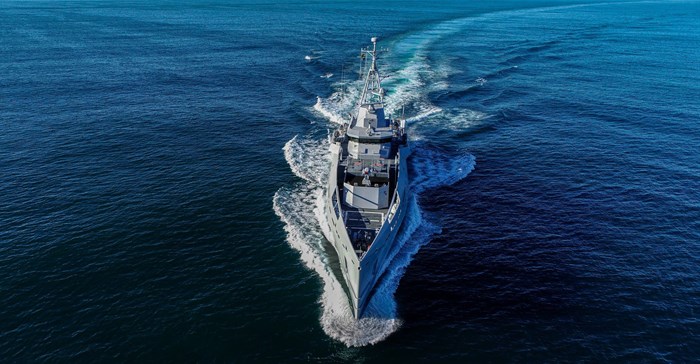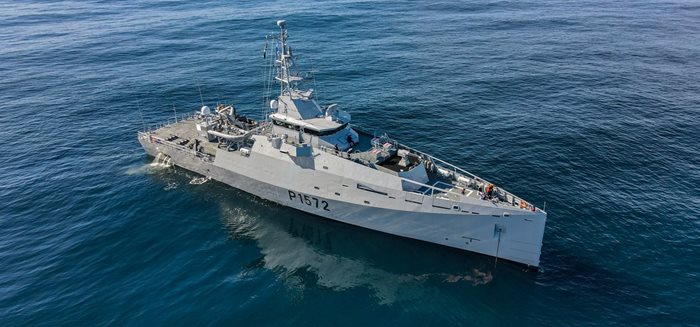The South African Navy proudly named the second of three multi mission inshore patrol vessels (MMIPVs) SAS King Shaka Zulu. Named for the great Zulu King the vessel was built entirely in South Africa at Damen Shipyards Cape Town and it was designed to deliver rapid response capabilities along South Africa's extensive 2,798km coastline and it is poised to play a pivotal role in safeguarding national waters.
King Shaka represents a symbol of strength, which will now live forever at sea, paying tribute to Zulu nation’s significant role in South Africa’s rich history.
The vessel’s Sea Axe hull design - patented by Damen and developed in partnership with Delft University - ensures exceptional seakeeping behaviour, reduced fuel consumption, and enhanced safety and comfort onboard.
These vessels, equipped with advanced military equipment bolster the navy's ability to respond effectively and swiftly to threats such as piracy, illegal fishing, and smuggling operations.
Arno J. van Niekerk 30 Oct 2023 The MMIPV project has not only fortified South Africa's maritime security but also contributed significantly to job creation and the development of small and medium-sized enterprises (SMEs).
A total of 848 local vendors have actively participated in the construction of the MMIPVs, highlighting the effectiveness of South Africa's industrial participation policy.
Job creation
Throughout the project's duration, it is estimated to have generated more than one million man-hours of work, supported over 1,000 direct jobs at Damen Shipyards Cape Town, and engaged nearly 4,000 individuals indirectly. The project has also fortified regional supply chains and created opportunities for skilled job seekers, promoting economic prosperity in South Africa’s Ocean Economy.
“I must congratulate Damen Shipyards Cape Town, Armscor, the Defence Materiel Division and the SA Navy who all formed part of the Integrated Project Team for their absolutely sterling work of building these ships on time, in budget and to specification,” vice admiral Lobese said.
“This was indeed a monumental task and serves as a testament to the willingness of various companies and organisations to come together to produce something that will benefit the people of South African for many years.”
SA is exporting technology
Sefale Montsi, director of Damen Shipyards Cape Town, emphasised the broader impact of this project on the nation's industrialisation journey.
“South Africa must continue to prioritise supporting local vessel suppliers because this creates jobs and develops transferrable skills which are in demand and can be used in other industries,” she said.
“New technologies are developed, opportunities from abroad are facilitated, and a base for growing exports is created and taken advantage of. As a result of our work on the MMIPV project, DSCT has exported vessels built here and equipped with South African products to Djibouti and UAE.”
The MMIPV project represents a significant success story for the South African Navy and the country’s shipbuilding and maritime industry.






























